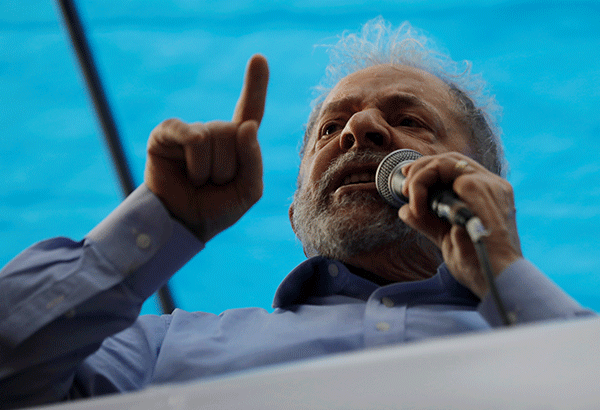Former president Luiz Lula da Silva at a recent rally
The most striking feature of one of January’s biggest news story was the feigned surprise. No, not the exposure of the horrible and sexist goings-on at the President’s Club in the UK, but Brazilians expressing shock that corruption is rife among its political system.
Three judges upheld ex-president Luiz Lula da Silva’s guilty verdict in January, all of who expressed such shock at his crimes that they increased his prison sentence to 12 years and overlooked the lack of any real damning evidence.
But the corruption found by Operation Car Wash (Lavo Jato) is not an historic anomaly. Neither was the previous Mensalão scandal. Rather, corruption is almost a consequence of Brazil’s fragmented party system – there are 28 political parties in congress at the moment, and that number could rise after this year’s election. And Brazilian politics has always been based on self-interest rather than ideology.
Lula himself is an example of this. The markets were scared at his assumption of power in 2002, but he didn’t attack the rich or the business community but worked with it to implement marginal social programmes – just quite why the market still jumps at the mention of Lula (and in this case his unsuccessful appeal) isn’t clear.
This lack of ideology has prevented Brazil becoming a Venezuela, but it also means that majorities are needed to approve new policies, which necessitates quid pro quos with many other parties. Throw in the close proximity of big business to the political class and it is a recipe for corruption.
Shocking levels
True, in recent years, corruption has reached shocking levels, and arguably recent governments institutionalized corrupt practices, but the righteous indignation that the coxinhas (middle-class Brazilians) throw at the petistas (supporters of the working party) feels willingly self-blind and hypocritical. They hounded out president Dilma Rousseff with huge street protests and then went mute and stayed at home when corruption allegations against the new president Michel Temer were squashed by a complicit congress.
If Brazil is to finally have the political class that Brazilians claim to want, the system itself must change. That would require popular pressure, because the conflict of interest for politicians to vote for serious change is clear.
The irony is that the political machinations that look like preventing Lula from running in this year’s presidential election – and therefore in theory increase the chances of a market-friendly centrist – could backfire badly. The 36% of voters who said they would vote for Lula in the most recent opinion poll are unlikely to simply shrug at the perceived injustice and vote for a moderate, careerist politician such as Geraldo Alckmin.
The hope is that this 36% bloc gets fragmented among fringe candidates and allows the establishment to get two of its candidates into the run off. But what if there is someone to rally around (and Lula himself is not definitely out of the race yet)? What if these voters, feeling angry and disenfranchised, latch onto a populist candidate who champions radical economic and social reforms and calls for corrupt politicians to be dragged into the streets? Jair Bolsonaro, perhaps.
So, while investors rejoice at Lula’s apparent absence from this year’s ballot, it is important to consider that in 2019 Brazil could be facing a future worse than one with Lula back in the Palácio do Planalto. The markets could be facing a devil they don’t know.
Link to the source of information: www.euronews.com


 Signal2forex.com - Best Forex robots and signals
Signal2forex.com - Best Forex robots and signals




